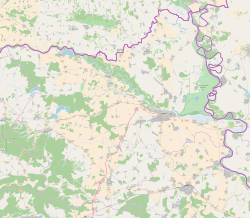Donji Miholjac
This article needs additional citations for verification. (August 2011) |
Donji Miholjac | |
|---|---|
| Grad Donji Miholjac Town of Donji Miholjac | |
Donji Miholjac | |
| Coordinates: 45°45′40″N 18°09′54″E / 45.761°N 18.165°E | |
| Country | |
| County | |
| Government | |
| • Mayor | Goran Aladić (Ind.) |
| Area | |
| • Town | 134.6 km2 (52.0 sq mi) |
| • Urban | 59.7 km2 (23.1 sq mi) |
| Population (2021)[2] | |
| • Town | 8,031 |
| • Density | 60/km2 (150/sq mi) |
| • Urban | 5,330 |
| • Urban density | 89/km2 (230/sq mi) |
| Time zone | UTC+1 (Central European Time) |
| Website | donjimiholjac |
Donji Miholjac (Hungarian: Alsómiholjác, German: Unter-Miholtz), is a town in the Slavonia region of Croatia, on the river Drava and the border with Hungary.
Population
[edit]In the 2011 census, there were 9,491 inhabitants in the area, 95% of them Croats.[3]
| population | 6136 | 6499 | 6101 | 7060 | 7821 | 8843 | 8769 | 8973 | 9660 | 10077 | 10225 | 9700 | 10003 | 10650 | 10265 | 9491 | 8031 |
| 1857 | 1869 | 1880 | 1890 | 1900 | 1910 | 1921 | 1931 | 1948 | 1953 | 1961 | 1971 | 1981 | 1991 | 2001 | 2011 | 2021 |
Settlements
[edit]There are seven settlements in the municipality:[4]
- Donji Miholjac, population 6,240
- Golinci, population 431
- Miholjački Poreč, population 183
- Podgajci Podravski, population 651
- Radikovci, population 292
- Rakitovica, population 868
- Sveti Đurađ, population 826
Politics
[edit]Minority councils
[edit]Directly elected minority councils and representatives are tasked with consulting the local or regional authorities, advocating for minority rights and interests, integration into public life and participation in the management of local affairs.[5] At the 2023 Croatian national minorities councils and representatives elections Serbs of Croatia fulfilled legal requirements to elect 15 members minority councils of the Town of Donji Miholjac but the elections were not held due to the lack of candidates.[6]
History
[edit]
In the late 19th and early 20th century, Donji Miholjac was a district capital in the Virovitica County of the Kingdom of Croatia-Slavonia. Its name comes from Saint Michael. During the time of Ancient Rome, it was called Mariniana.[7] There are several suggested etymology for the name "Mariniana". One is that it comes from the Roman personal name "Marinus". The other is that it comes from the Indo-European roots *mory and *h1ny, so that it means "marshy valley". If so, the same root is seen in the names "Mursa" and "Marsonia".[8][unreliable source?]
Colonist settlements of Bockovac and Gložđe were established on the territory of the town municipality during the land reform in interwar Yugoslavia.[9]
References
[edit]- ^ Register of spatial units of the State Geodetic Administration of the Republic of Croatia. Wikidata Q119585703.
- ^ "Population by Age and Sex, by Settlements" (xlsx). Census of Population, Households and Dwellings in 2021. Zagreb: Croatian Bureau of Statistics. 2022.
- ^ "Population by Ethnicity, by Towns/Municipalities, 2011 Census: County of Osijek-Baranja". Census of Population, Households and Dwellings 2011. Zagreb: Croatian Bureau of Statistics. December 2012.
- ^ "Population by Age and Sex, by Settlements, 2011 Census: Donji Miholjac". Census of Population, Households and Dwellings 2011. Zagreb: Croatian Bureau of Statistics. December 2012.
- ^ "Manjinski izbori prve nedjelje u svibnju, kreću i edukacije". T-portal. 13 March 2023. Retrieved 2 May 2023.
- ^ "Informacija o konačnim rezultatima izbora članova vijeća i izbora predstavnika nacionalnih manjina 2023. XIV. OSJEČKO-BARANJSKA ŽUPANIJA" (PDF) (in Croatian). Državno izborno povjerenstvo Republike Hrvatske. 2023. p. 12. Archived from the original (PDF) on 3 June 2023. Retrieved 3 June 2023.
- ^ "The history of Donji Miholjac on its official site (Croatian)".
- ^ "Croatian toponyms - Linguist Forum".
- ^ Šimončić-Bobetko, Zdenka (1990). "Kolonizacija u Hrvatskoj 1919.—1941. godine" [Colonization in Croatia Between 1919 and 1941]. Povijesni prilozi (in Croatian). 9 (9). Zagreb: Hrvatski institut za povijest: 160–162. ISSN 0351-9767.
External links
[edit]- Official website (in Croatian)
- Donji Miholjac unofficial page (in Croatian)












